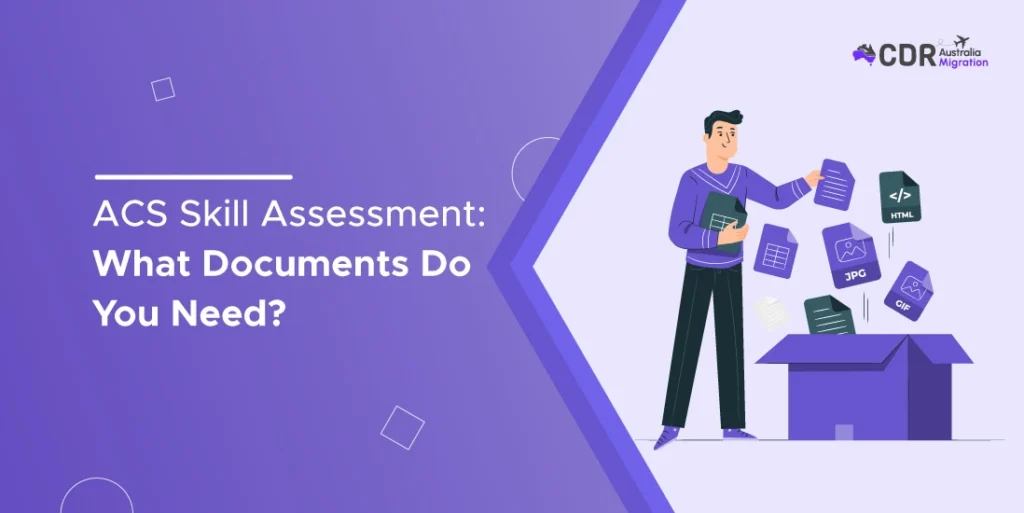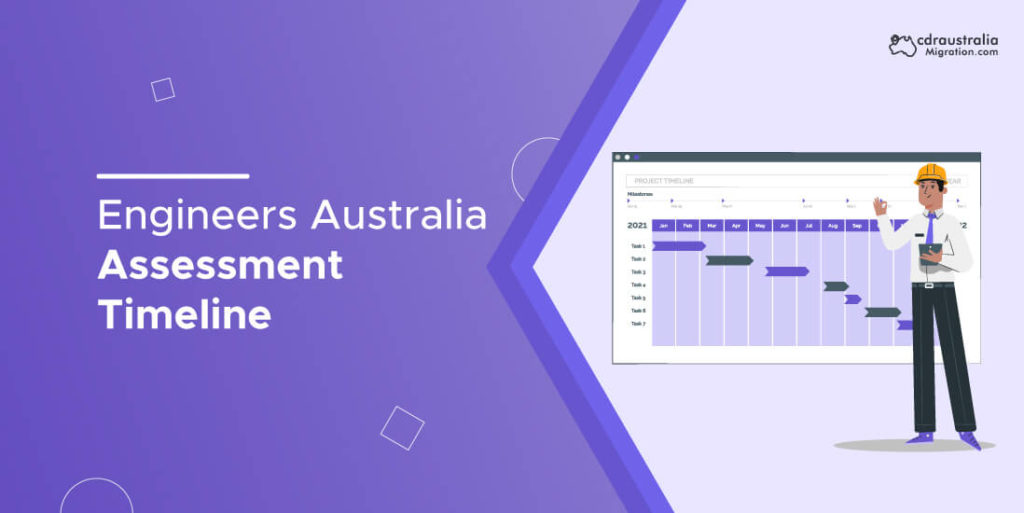An ACS skills evaluation is essential for Australian migration because it assesses your credentials, career experience, and aptitude for an information technology position.
The ACS assesses whether your skills match the requirements of the Australian governmental criteria for the positions specified in the Skilled Occupation List SOL. The assessment of ACS can identify qualified applicants from those who do not qualify.
The Australian market is detecting rapid growth in the information and communications technology field, and the ACS Australia assessment raises the chances of obtaining a visa and getting a job within the ICT sector.
The checklist for the skills assessment provided by ACS is meant to ensure that you have all of the necessary components, including your work history, qualifications, and all documents needed, to facilitate a smooth migration. This blog will provide all the necessary information regarding the ACS skill assessment for Australian migration.
What is ACS skill assessment?
The Australian Computer Society (ACS) is responsible for the skills assessment, which is based on all applicant’s education and professional experience against particular ANZSCO occupation codes.
The ACS is also the evaluating body for IT professions as per Australia’s skilled migration programme, and they assess the applicants accordingly.
Achievement of the ACS Skills Assessment is mandatory before submitting an EOI for Skilled Independent (Subclass 189), Skilled Nominated (Subclass 190), and Skill Work Regional (Subclass 491) visas.
ACS skill assessment document checklist
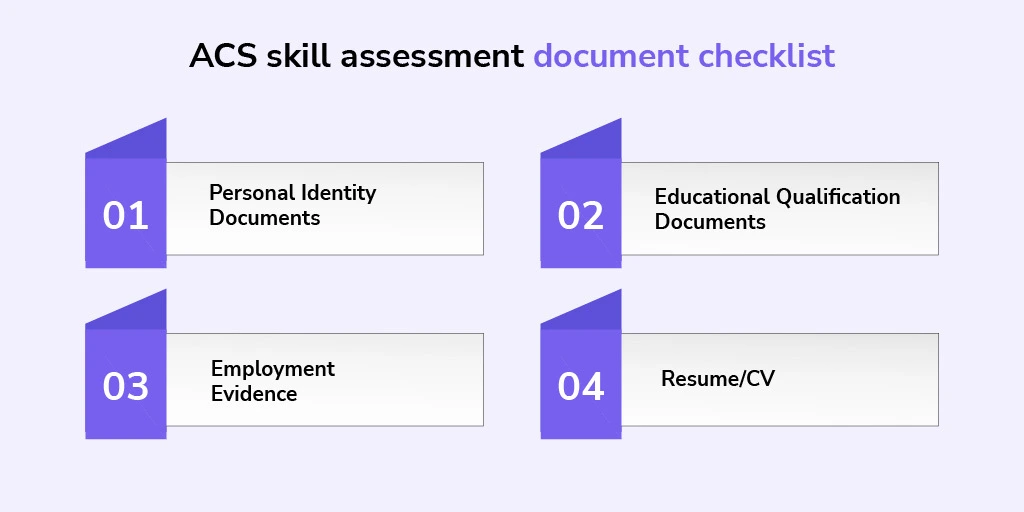
As part of the modifications made in the ACS Skills Assessment application, you must select a few documents that verify your identity, educational credentials, and work experience. This is a thorough checklist:
1. Personal Identity Documents
a. Passport
A valid passport embossed with your full name, likeness, and date of birth appears in full colour scanned, and passport pages are visible.
b. Passport-Size Photograph
c. Proof of Name Change (if applicable):
If applicable, a name change certificate, affidavit, marriage licence, and any government-issued name change certificates are required legal documents.
2. Educational Qualification Documents
a. Degree Certificate(s)
All academic degrees, such as bachelor’s, master’s, or its equivalent, need certified copies of other documents appended.
b. Academic Transcripts
Official proof of subjects studied, grades achieved, and completion dates need to be recorded in graded transcripts.
c. Additional Certifications (if applicable):
Professional-endorsed documents, such as those from Microsoft and Cisco, are related to information and communications technology.
3. Employment Evidence
About every job you claim to have relevant work experience in ICT:
Employment Reference Letter
- On Company Letterhead
- Includes job title
- Start and end dates or to date if still employed.
- A detailed description of duties performed aligned with the occupation you’re applying for.
- Full-time or part-time status along with the hours worked.
4. Resume/CV
An up-to-date CV that shows your education, work history, abilities, and qualifications.
ACS Skills Assessment application process
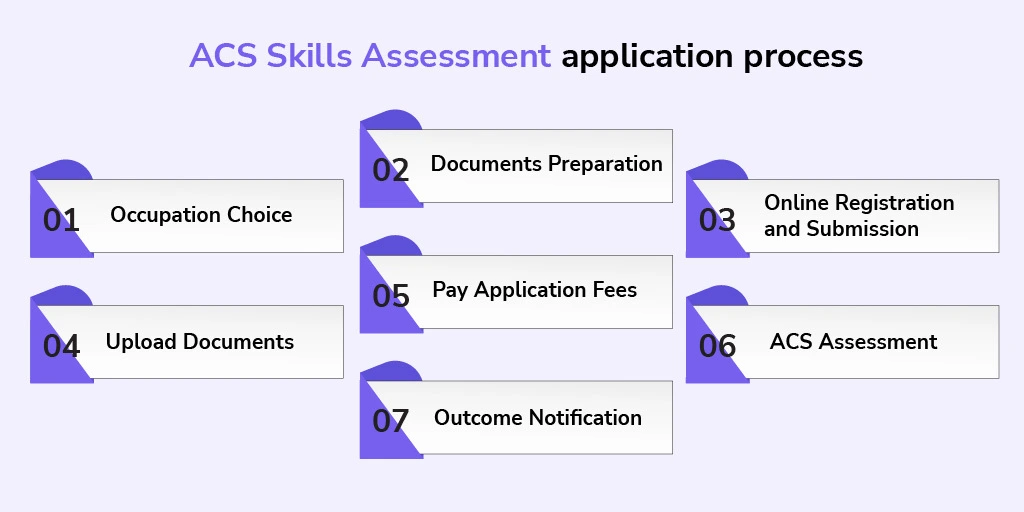
1. Occupation Choice
ICT professions from the Sector Occupation List that are suitable for your qualifications and skills.
2. Documents Preparation
Collect all needed certificates, like transcripts, evidence of working experience, and English proficiency tests.
3. Online Registration and Submission
Create your account in the ACS and fill out the online form.
4. Upload Documents
Append all required documents to the online portal.
5. Pay Application Fees
Pay a standard application fee through the online payment platform.
6. ACS Assessment
Your qualifications and work experience, as well as your English proficiency, will be assessed by the ACS.
7. Outcome Notification
You will receive notification from the ACS regarding the outcome of your assessment via email.
Key Consideration
a. Thorough preparation
Ensure that all documentation is accurate and complete.
b. Know the Requirements
Familiarise yourself with specific requirements for the selected occupation.
c. Effective Help
Consulting a registered migration agent may be worth it for professional quality help.
ACS Skill Assessment Processing Time
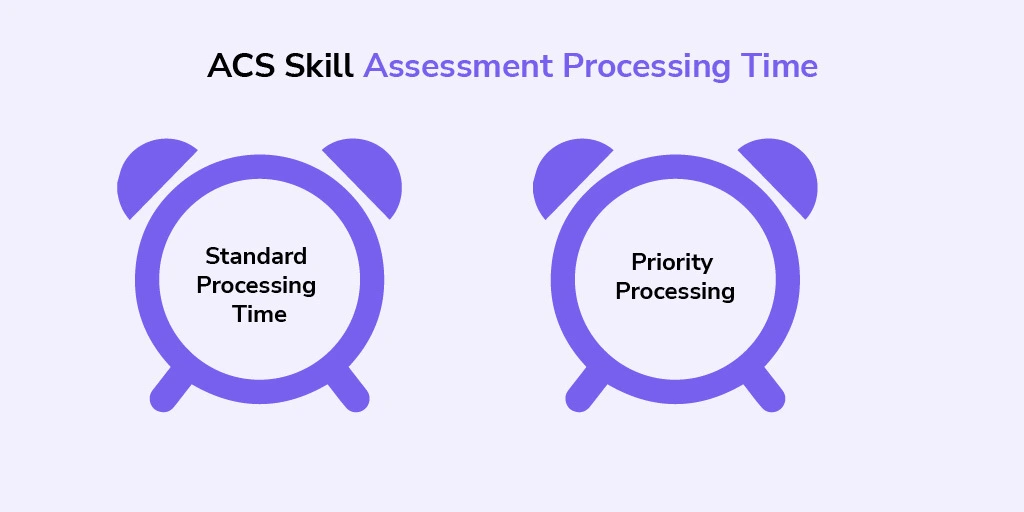
1. Standard Processing Time
Generally, the ACS reviews standard applications within eight to ten weeks. It may take this long after your application with fees paid and all accompanying documents have been lodged.
The period may differ depending on the number of applications or extra information required.
2. Priority Processing
In urgent cases, this might be treated as priority processing. This streamlines the assessment process.
Nevertheless, acceptance is at the discretion of ACS, and you’ll need to justify the urgency with authentic reasons. If the application is approved, processing can occur in much less time.
ACS Skills Assessment Fees
According to the various types of assessments you apply for, the ACS charges different fees. The breakdown is given below:
1. Temporary Graduate (Subclass 485) Skills Assessment: AUD 500
For applicants for temporary graduate visas (Subclass 485) who have finished their coursework within the last two years.
This assessment is done to see if your ICT qualifications are recognised as well as equivalently valued in Australia.
2. Skills Assessment (General, Post-Australian Study, RPL): AUD 600
a. General Skills Assessment
For applicants with ICT qualifications and work experience seeking migration.
b. Post-Australian Study
International students who obtained their ICT qualification in Australia.
c. RPL (Recognition of Prior Learning)
For people without formal ICT qualifications but significant experience in ICT. This involves the submission of detailed project reports to establish relevant skills.
3. Review of Assessment Outcome: AUD 395
If you feel the outcome of your assessment is incorrect and you want a review of such decisions,
It is the same assessment procedure without the provision of any further information.
4. Appeal Application: AUD 395
In this case, if you are unsatisfied with the outcome of the review, you can set an appeal.
Appeals differ from reviews, as they allow for new evidence or additional documents to be presented.
The decisions made on appeals are then submitted to a separate panel for review in private.
Know more: ACS skill assessment process and its cost 🤔💭
What are the common mistakes to avoid?
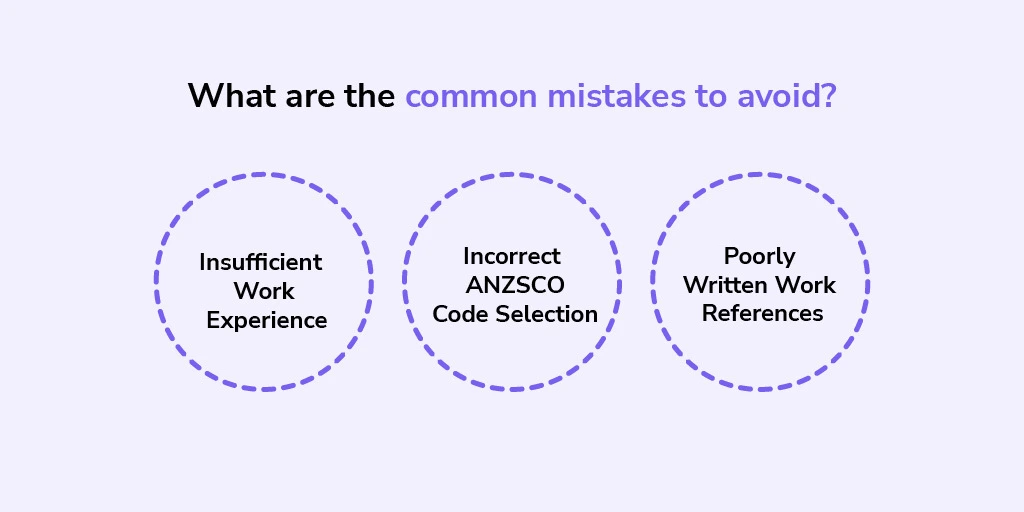
While applying for an ACS Skills Assessment for migration to Australia, even the littlest flaws could lead to rejection. It is important to identify how to avoid common mistakes if you are to give yourself an extra chance of success.
Here is a breakdown of the most common reasons for an assessment failure:
1. Insufficient Work Experience
ACS uses a formula to decide equal years of relevant work experience to meet the standards set by the nominated occupation. Failure to meet the years-at-work requirement would harm the assessment.
How to Avoid?
- Make sure your work experience aligns with the years required for your ANZSCO CODE.
- Provide detailed documentation such as an employment contract, payslips, reference letters, and the original job description.
- Clearly explain your job roles, responsibilities, and the technical skills you used.
2. Incorrect ANZSCO Code Selection
Different codes are assigned to various ICT professions by the objective of the Australian New Zealand Standard Classification of Occupations (ANZSCO). The wrong one not only may be inapplicable but may also lead to rejection, as this means that your other qualifications or work experience are irrelevant.
How to Avoid?
- Read the ANZSCO descriptions very carefully and choose one that matches your job most closely.
- Consider getting advice from a migration agent, if unsure; they could advise you on rendering your experience to get the right code.
- Do not select an ANZSCO code solely based on being eligible for points; it should represent your actual knowledge and skills.
3. Poorly Written Work References
Insufficiently detailed and unclear work references make it extremely difficult for ACS to verify your skills and responsibilities.
How to Avoid?
- Make sure that your employment references contain, where possible:
- Job title and duration of employment.
- Full description of the job functions.
- Techniques, tools, and methodologies you used.
- Contact details of the employer plus the signature of an authorised person.
- Improve the credibility of references by ensuring proper formatting and using professional language.
Tips for the Successful ACS Skill Assessment
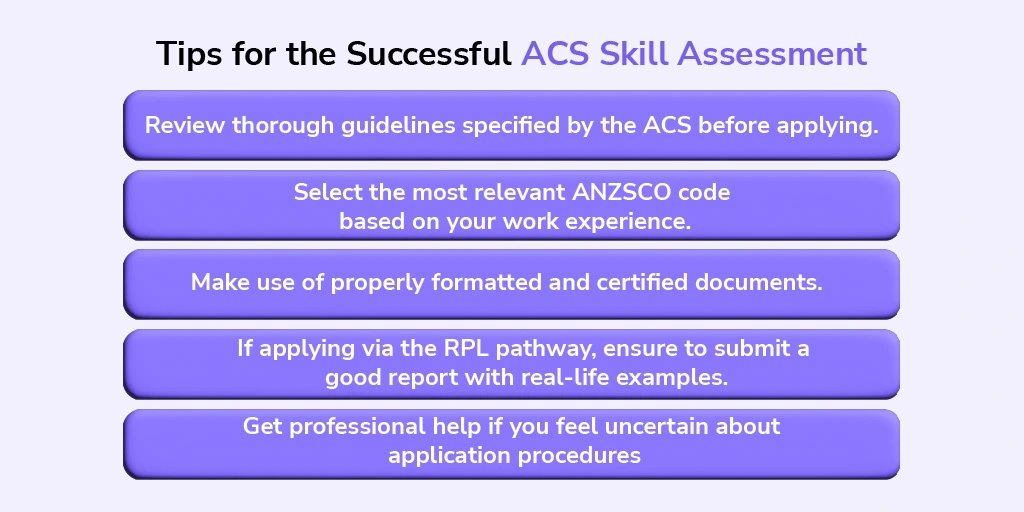
1. Review thorough guidelines specified by the ACS before applying.
The ACS skills assessment lays down different guides for various types of assessments, including General Skills Assessment and Recognition of Prior Learning, and assessments post-Australian study.
Non-disclosure of relevant information may cause rejection of the application or undue delays.
2. Select the most relevant ANZSCO code based on your work experience.
It is your ANZSCO code that will actually determine how ACS views and assesses your skills. Choosing the wrong code, which does not go with your duties, may result in a rejection.
3. Make use of properly formatted and certified documents.
Poorly formatted, unstructured, or non-certified documents tend to delay or lead to outright rejection.
4. If applying via the RPL pathway, ensure to submit a good report with real-life examples
The RPL is meant for applicants with years of experience but no formal ICT qualifications. A petty RPL report can at any time lead to rejection.
5. Get professional help if you feel uncertain about application procedures
ACS assessment could be quite complicated, especially if you do not know the migration requirements of Australia. Wrong moves could end up costing along with finances.
Learn more: Your Pathway to Migrate to Australia 🧑✈️
What happens after submission?
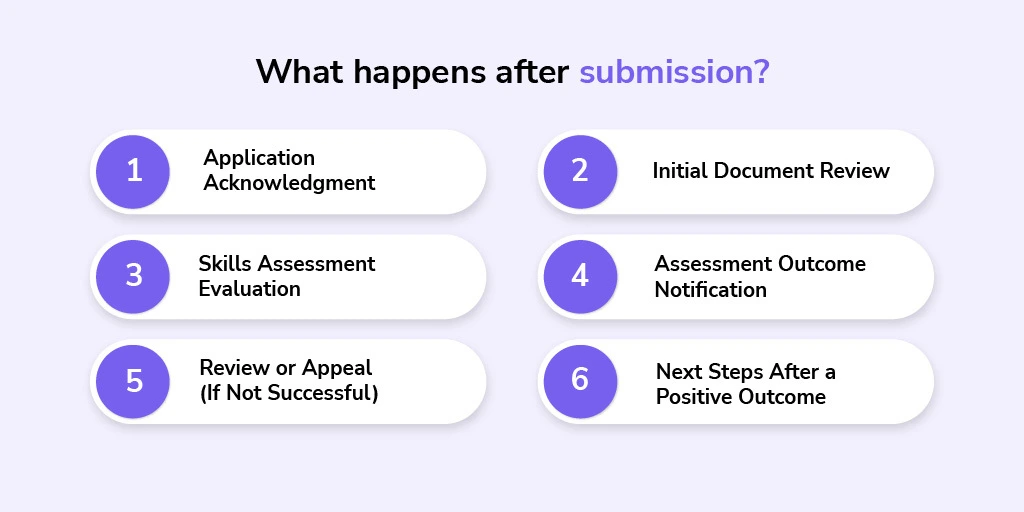
The ACS Skills Assessment application goes through various phases after submission.
Following the above steps should give you sufficient information to help you conveniently follow the whole process of your application and adequately prepare for the subsequent phases of your migration journey to Australia.
1. Application Acknowledgment
Once your application is submitted, an email acknowledgement will be sent to you by ACS informing you that they have received your application.
2. Initial Document Review
ACS will perform an initial review and make sure that:
- All required documents have been submitted.
- Documents are clear, legible, and properly certified.
3. Skills Assessment Evaluation
A case officer will be assigned to assess your application. They will pay particular attention to:
- Your qualifications to check if they meet the Australian educational standard.
- Your post-qualification work experience as it relates to your selected ANZSCO code.
- The technical details of your RPL.
4. Assessment Outcome Notification
Once the assessment has been finalised, ACS sends you an official letter of the outcome through email. The letter describes if your skills have been assessed as suitable for migration purposes or not.
5. Review or Appeal (If Not Successful)
What to Do After Receiving a Negative Outcome?
a. Review Application (AUD 395)
If you wish to check for potential errors in the assessment, it is possible to ask for a review of your initial submission.
b. Appeal Application (AUD 395)
If it’s considered that very few changes have occurred based on a review, the application can be appealed on close walls along with appropriate evidence for support.
c. Next Steps After a Positive Outcome
In case a positive outcome is received:
Using the ACS outcome letter, apply for your visa through the Department of Home Affairs on time.
Conclusion
The ACS Skills Assessment is one of the most important events in your Australian migration process, especially for those in the IT profession. Knowledge of the assessment criteria, proper pathway selection, and avoidance of common reasons for rejection mainly improve your chances of success.
The preparation is tedious and takes considerable time, but you can be successful with the required preparation. If in doubt, seek the advice of an expert who will see you through it and ensure your application is as strong as it can be.
FAQs
1. What are the payment evidence documents for ACS?
The payment evidence documents for ACS include:
- Receipt or Payment Confirmation
- Credit/Debit Card Statement
- Bank Transfer Receipt
2. How long does it take for an ACS skill assessment?
The ACS skills assessment usually takes 8 to 12 weeks. However, processing time may vary depending on application volume and complexity.
3. How do I check the ACS skill assessment status?
You can check the ACS skill assessment status in the ACS online portal from where you submit your application.
4. Does the ACS skill assessment expire?
Yes, the ACS assessment is valid for 3 years from the issued date. So, after that, a new assessment is required to apply for a visa or other purposes.
5. Do we need an English test for skill assessment at ACS?
No, an English test is not required for skill assessment at ACS. However, evidence of your English proficiency is needed while applying for a visa.
6. How does ACS verify employment?
ACS verifies employment through various methods, such as:
- Employment Reference Letter
- Payment Evidence
- Employer Verification

